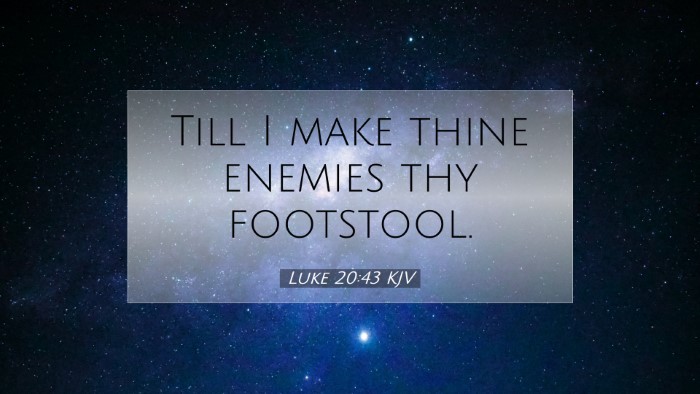Commentary on Luke 20:43
Verse Context: Luke 20:43 states, "Till I make your enemies your footstool." This verse carries profound theological implications about Christ's authority and His ultimate victory over His adversaries.
Introduction
This verse is a quotation from Psalm 110:1 and is used by Jesus in the context of His discussion with the religious leaders. Understanding its implications requires examining its Old Testament roots as well as its firm groundwork in New Testament theology. Both its immediate context in the Gospel of Luke and its broader reference to the Messianic promise are pivotal.
Historical Context
Jesus was ensconced in a confrontational dialogue with the Pharisees and Sadducees regarding His authority (Luke 20:1-8). In this ongoing discourse, He uses Psalm 110 to challenge their preconceived notions about the Messiah. By invoking David, the revered king, Jesus subtly reveals that the Messiah is not merely a descendant of David but also Lord over him, highlighting His divine authority.
Theological Insights
- The Nature of the Messiah: Matthew Henry elaborates on how this passage illustrates the dual nature of Christ – fully divine and fully human. The quoted phrase emphasizes that while Christ is a descendant of David, He is also sovereign over David.
- The Enemies of Christ: Adam Clarke points out that the 'enemies' referenced in this verse encompass all antagonistic spirits and forces, foreshadowing Christ's ultimate conquest over sin and death. This victory is not merely spiritual but also ecclesiastical and political, as it signifies the establishment of God's kingdom on earth.
- Symbolism of the Footstool: Albert Barnes discusses the cultural significance of a footstool in ancient times, serving as a metaphor for complete subjugation. The enemies of Christ, whether understood in personal, corporate, or cosmic terms, are laid low under His feet, highlighting His authority and kingship.
Exegetical Analysis
The phrase "till I make your enemies your footstool" implies a definitive action that is to occur—indicating that God has a plan for the Messiah to subdue all opposition. In the eschatological framework, this speaks to both a historical and prophetic fulfillment of God's promises. It suggests a period of waiting leading up to a climax of divine intervention.
Verse Breakdown
- "Till": This word denotes an expectation of fulfillment. It communicates the idea of time and progress towards a specific goal.
- "I make": This phrase asserts God's active agency. It is a promise of action by God regarding the destiny of Christ's enemies.
- "Your enemies": The term encompasses all who oppose Christ, including spiritual forces (Ephesians 6:12) and those who resist His will on earth.
- "Your footstool": This metaphor evokes imagery of dominance. To be a footstool indicates complete conquest, implying that Christ will have ultimate control over all His adversaries.
Practical Applications
The implications of this verse extend beyond academic discourse into the practical lives of believers. Understanding Christ’s authority offers reassurance in the midst of conflict.
- Confidence in Christ’s Victory: Believers can rest in the knowledge that Christ is ultimately victorious, and this should empower them in their own spiritual battles.
- The Call to Worship: Recognizing Christ's authority calls for a response of worship and surrender, placing Him in the position of Lord over one’s life.
- Encouragement in Trials: Matthew Henry highlights how this promise reassures individuals facing persecution or opposition, reminding them that justice and victory belong to God.
Conclusion
In Luke 20:43, we find a rich theological tapestry woven through historical context, prophecy, and practical application. This verse isn’t merely a prophetic statement about the Messiah; it is a profound declaration of hope and assurance for believers today. The challenge lies in recognizing Christ's authority in our lives and embracing our roles as His followers, confident that He is subduing all opposition and leading us into His eternal victory.


